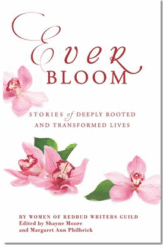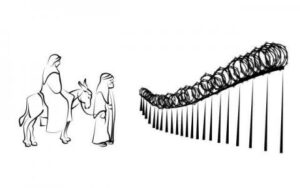
I was nine years old when it happened, peering out the window of our second-story apartment in Monrovia, Liberia. The multiplex we lived in was in a good area, popular with internationals; the families on the top story were from India, the Peace Corps volunteers across the hall were American like us, and Mrs. Richards, the Liberian woman who owned the place, claimed the bottom level for her sprawling family, which seemed to be made up entirely of women and children. It was right across the street from JFK Hospital (ominously dubbed the “just for killing” hospital by the locals), where Mrs. Richard’s live-in nieces, nephews, grandchildren, and I took turns donning my Care Bear roller skates and zipping down the cracked concrete wheelchair ramps, launching ourselves into the foliage that had muscled its way up through the pavement. We had a coconut tree in the front yard, a persimmon tree in the back, and a high concrete wall separating the clean, well-kept courtyard from the neglected street.
But if you looked out our hallway window, you could see the part of town where people lived in zinc shacks and cooked their meals on “country stoves,” camp-style burners with an open flame for boiling rice and frying plantain. It wasn’t off-limits necessarily—I’d venture in that direction to buy peanut candy and sour green oranges from market ladies, and several kids from that neighborhood would come over to play four square and teach us Bassa cuss words—but it was not a place where we spent much time.
I was standing at that hallway window, gazing down at the scene unfolding just outside our wall. A woman was curled up on her side under a palm tree, worn T-shirt stretched thin across her torso as she shielded her head with her dusty black arms, lappa-clad knees tucked close to her chest. The man kicking her wore camouflage, and had a government-issued machine gun slung over his shoulder.
I was horrified.
It wasn’t that I hadn’t witnessed beatings before. I had. It wasn’t unusual to see mothers beating their children for disobedience or mistakes, preparing them to survive in unforgiving circumstances. Cries of “Rogue! Rogue!” would ring through our neighborhood as mobs chased down petty thieves; my father would sprint out the door to try to stop the flogging sure to take place when the offender was caught. But this was different, an armed man beating a helpless, cringing woman. And I had heard the whispers, the muted conversations adults thought I was too young to understand, about what men with guns did to women.
But this was different, an armed man beating a helpless, cringing woman. And I had heard the whispers, the muted conversations adults thought I was too young to understand, about what men with guns did to women.
I heard my father’s footsteps approaching and stood as still as possible, expecting to be shooed away from the window. But he stopped a few steps behind me and just stood there, watching the scene over my head. Or maybe watching me watch the scene. Then he sighed, turned, and walked away without a word.
The tectonic plates of my young soul shifted. Why wasn’t my father, my hero, going out there to help the woman? What was different between this and all other times when he had intervened?
Slowly and sure as sunrise, it dawned on me that the gun threw the weight of the government behind the man and the violence he was meting out. It occurred to me that since this was happening in broad daylight, the soldier was probably the woman’s husband, her only source of economic support. Maybe she didn’t have a mama like Mrs. Richards, a fierce and competent matriarch, to scare away the riffraff and shelter her when things turned sour. If my father charged out there and did what every fiber of his Midwestern upbringing was undoubtedly screaming at him to do, it would likely spur the man on to further violence, and make matters worse for the woman.
For the first time, I understood that there were some problems my father, the strong, white, influential American man, couldn’t fix.
He couldn’t fix it, because the scourge of violence against women is not a simple battle that a strong army can rush in and win. It is a pandemic, a highly contagious pathogen that eats away at the hearts, minds, and souls of men, women, and children. It is a noxious weed that spreads more spores when attacked with swinging machetes. Strategic intervention is necessary, but you can’t just treat the symptoms or mow the weed down from the top. You need to go deep under the surface, identify the source of the disorder, and neutralize the violence where it begins, in the small seed of pride, disdain, bitterness, or despair dropped into the human heart.
But if a tiny seed could sprout into that pervasive ugliness, why couldn’t a tiny seed of something better, something stronger, overtake it and choke it out? I had seen the native foliage break through concrete at the “just for killing” hospital, knew that tiny living organisms with interlocking root systems could decimate ugly gray structures that had stood for generations. Maybe this was not a job for warriors, for powerful men with worldly influence. Maybe this was a job for gardeners, for people with patience, persistence, and a steely commitment to making the world a more beautiful place, one soul at a time. A job for elderly grandmothers and outraged aunties, for concerned sisters and countercultural men—for little girls armed with nothing more than righteous indignation, a life to spend, and a willingness to put their hand to the plow.
I felt a seed of something better, something stronger, drop into my nine-year-old soul, and I patted the soil around my newly acquired resolve.
Taken from Everbloom: Stories of Deeply Rooted and Transformed Lives. Reprinted with permission from Paraclete Press.


